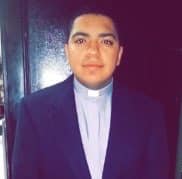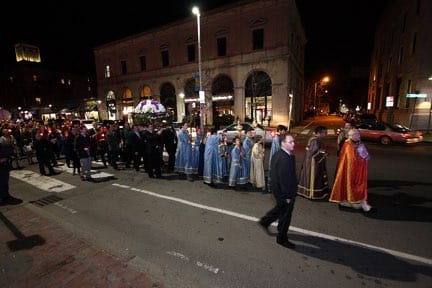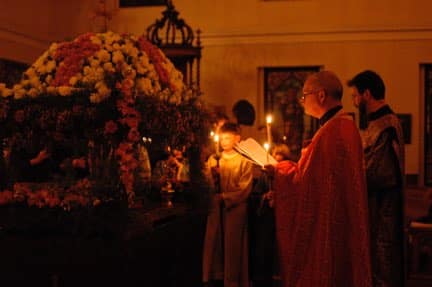April 3, 2018

When attending the Orthodox Good Friday Service of Lamentations, I must say that my views of God and the manner in which God functions has changed. Throughout the year I’ve had the pleasure to visit different Pentecostal, Baptist, Catholic churches but this service was unlike any other. Once I reached St. Mary’s Orthodox Church, I could instantly feel the love they not only had for the people but for God himself. I was quickly greeted and guided by church leaders and common church members to partake and enjoy the service.
The service gave me a fresh outlook on the Christian faith. It involved ancient liturgy, which is something I hadn’t seen in other branches of Christianity, and to me this was very enriching. Everything—from the ancient chants to the “tomb” of Jesus placed in the center of the room and covered with flowers—submerged me in the service and added to my own personal experience of God. The service then was brought out onto the streets of Cambridge. As flower petals were tossed onto the floor, we followed one another closely as we chanted in unity.
To my amazement, I discovered that we were actually on our way to meet with another Orthodox church who joined us in the middle of Central Square to pray and worship together. Worshipping alongside them was the most amazing part for me. People from all ends of the world around me and waves of strangers from the streets began to participate and ask questions. The love of God was being shared with hundreds of people.
On our way back to the church, we then walked under the tomb covered with flowers. I later was told that this symbolized us going from death to life, which brought humility to my heart and filled my heart with passion. The ability for me to participate in these customs was life changing. It left me with so many more questions connected to the meaning behind their liturgy and the symbolism used throughout the service. The service also increased my desire to know God to a greater extent; the level in which I believed to know him wasn’t enough. By the end of the service, I did not feel as if I was a guest or stranger but part of the family, which was amazing because I wasn’t proficient at all in their liturgical customs.
As the service finished, I was astonished by how welcomed I felt, which is so different than the primary mindset that churches have had for so long. We see that people of Christian faith are likely to seclude themselves and limit their interactions to only those of the same church, leaving Jesus and all his teachings in the backburner and clinging to their denominational understanding. We then create barriers separating one another, yet in reality we are one body in Christ. The reality is that we all have one small piece of the grander knowledge of Jesus and the Christian faith. It is only when we converge together that we expose the masterpiece that God always had in mind.
The unity within the Christian Church is not only beneficial, but is necessary. Scripture continually promotes that God’s desire is for us to function as “one” Church, meaning that Christ came to make us one in Him. Being able to love and worship Christ along with my Orthodox brothers and sisters was life-changing for me. I saw people loving God with all their heart, soul, mind and strength, and loving their neighbors as they love themselves. If I could feel the presence of God and his love in a church that is very different than my own, then why can’t we all?
Let’s come together and see that the things that separate us as God’s people are the things that will help us come closer together. Let’s come together and be one river with many streams, and one body with many parts!
Rev. Jacob Urena is an ordained deacon in the Communion of Evangelical and Episcopal Churches which converges the evangelical, charismatic, liturgical, and sacramental traditions of the Christian faith, and a member of the Order of St. Martin de Porres (osmdp.org). His passion is to promote unity within and between churches.


